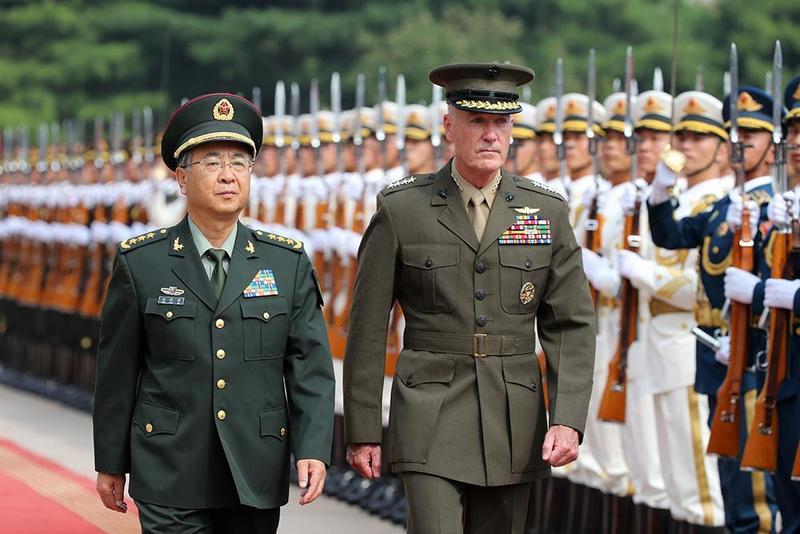Media Report

- Foreign Policy comments: "President Trump and the North Korean regime of Kim Jong Un have scaled back the rhetoric in recent days, after a week of sparring over North Korea's missile and nuclear programs that had many fearing the two countries were stumbling toward military conflict. But things remain dicey. Gen. Joseph Dunford, the chairman of the Joint Chiefs has spent the last several days in China meeting with military and political leaders, and on Wednesday, will make what the WSJ says is a rare visit 'to the Chinese armed-forces command that oversees the territory bordering North Korea, a move experts say suggests Beijing's displeasure with Pyongyang.' Dunford and his counterpart, Gen. Fang Fenghui signed an agreement aimed at improving communication between the their military forces that will 'reduce the risk of miscalculation' in the region, according to a Pentagon statement. Muscle flexing. Tensions have cooled, but are hardly gone. In the coming days, thousands of U.S. and South Korean forces will conduct an annual war game guaranteed to anger the North, which sees such demonstrations as a provocation."
- CNN reports: "China's vast holdings of U.S. government debt jumped $44 billion to $1.15 trillion in June, according to U.S. Treasury Department data. That took China above Japan, which offloaded $21 billion in U.S. bonds in the month. Japan had held the position of Uncle Sam's biggest creditor for the previous eight months, but Beijing's renewed appetite for U.S. debt has brought it back to the top. China was dumping U.S. Treasuries in 2016 so that it could buy its own currency -- the yuan -- to counter downward pressure caused by a huge outflow of cash from its economy. Since early this year, however, its holdings of U.S. debt have steadily ticked up. The shift coincides with new government controls on money leaving China that have helped ease the pressure on the yuan. The Chinese currency has gained almost 4% against the dollar so far this year."
- The Washington Post comments: "For decades, the United States has been trying to get China to use its influence and power to isolate North Korea. Now, experts are asking, why doesn't the United States try working with North Korea to isolate China? That could be a game changer not just for the North Korea crisis but for the entire region. The Kim Jong Un regime is no friend of Beijing. In fact, China-North Korea relations are at a historic low point since the young Kim came to power. Kim has refused to meet with senior Chinese leaders, and he even apparently assassinated his own half-brother, who was living under Chinese protection. The time might be right to approach Kim with a better deal for his regime and his people by offering him a grand bargain that would take North Korea away from China and bring it into the camp of the United States and its allies. It's a difficult gambit, for sure. But even if the United States can't peel North Korea fully away from its chief sponsor state, opening that avenue of diplomacy might still be useful toward breaking the stalemate between Washington and Pyongyang."
Calendar
- 2017-08-15 Trump administration goes after China over intellectual property, advanced technology
- 2017-08-14 We're Holding Pyongyang to Account
- 2017-08-13 China a sweet spot for US companies' earnings in second quarter
- 2017-08-11 China warns North Korea: You’re on your own if you go after the United States
- 2017-08-10 When the U.S. Last Faced an Emerging Nuclear Threat in East Asia
- 2017-08-09 Trump appears to grant China banks sanctions reprieve after UN deal
- 2017-08-08 China's international trade grows less than expected, surplus with US dips
- 2017-08-07 China says it’s done its part to rein in North Korea—now the US and South Korea should step up
- 2017-08-06 China says sanctions needed for North Korea but talks crucial
- 2017-08-04 With live-fire drill, China warns India not to test Beijing
News
- CNN China is America's biggest creditor once again
- Reuters China's Belt and Road acquisitions surge despite outbound capital crackdown
- CNBC India, China soldiers involved in border altercation: Indian sources
- Bloomberg China Reclaims Spot as World's Biggest Holder of Treasuries
- CNN US, China military chiefs reach deal to reduce 'risk of miscalculation'
- TIME China Tells U.S. and North Korea to 'Hit the Brakes' on Threats
- Reuters China angered at U.S. criticism of religious freedom, says U.S. not perfect
- Financial Times State support has a downside for China's tech titans
- CNN China tells US and North Korea to cool it
- Reuters China urges India to protect peace after border altercation
- CNBC The latest market to go berserk in China: Steel prices
- Business Insider China and North Korea's worst nightmare is coming true with US missile defenses in South Korea
- CNBC China has got to fix its debt problem, the IMF says
- Quartz In the version of history found in India's new textbooks, China lost 1962 and Gandhi wasn't murdered
Commentary
- Foreign Policy U.S. and China Ink Military Agreements; Mattis And His Troop Talk
- The Washington Post Can the United States play North Korea against China?
- The New York Times Squeezed by an India-China Standoff, Bhutan Holds Its Breath
- Forbes One Thing The U.S. Has Over China: Youth
- The Wall Street Journal IMF and China Don't See Eye-to-Eye
- The National Interest Are Russia and China Preparing for War?
- Forbes China's Biggest Mobile Payment Solutions Are Taking Root In U.S. and Europe
